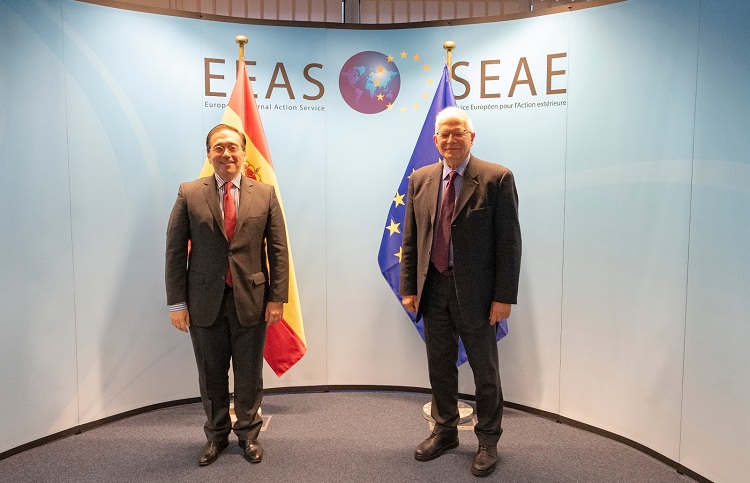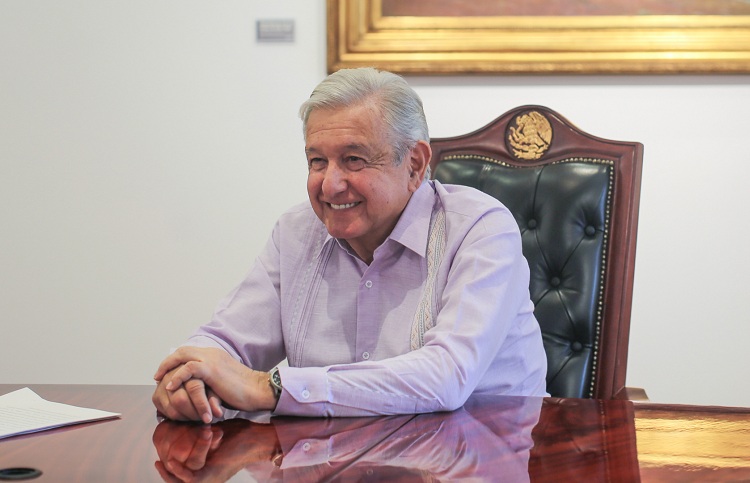The Diplomat
The Minister of Foreign Affairs, José Manuel Albares, met yesterday in Brussels with NATO Secretary General Jens Stoltenberg and the EU High Representative for Foreign and Security Policy, Josep Borrell, to address, mainly, the crisis between Ukraine and Russia.
Albares arrived in Brussels a day after traveling to Kiev to meet with Ukrainian President Volodimir Zelenski, Prime Minister Denis Shmyhal and Foreign Minister Dmytro Kuleba as part of the intense “high-intensity diplomacy” launched by the international community to prevent an armed conflict between Ukraine and Russia. In this visit, Albares reaffirmed Spain’s support for “the sovereignty and territorial integrity of Ukraine”, assured that the Government of Pedro Sánchez is willing to work in a coordinated manner within the EU to apply new dissuasive measures to Russia and avoided any reference to the possible sending of Spanish weapons to Ukraine because “this is the time for diplomacy and not to open scenarios and hypotheses that are not there”.
Albares’ day in Brussels began with a meeting at NATO headquarters with Jens Stoltenberg, with whom he discussed “the Madrid Summit, the new Strategic Concept and the security situation in Europe,” as the minister reported through his official Twitter account. At the meeting, Stoltenberg thanked “Spain’s long-standing contributions to shared Euro-Atlantic security” and reiterated NATO’s commitment to Ukraine’s sovereignty and territorial integrity and to the “dual track” approach (dialogue and deterrence) vis-à-vis Russia, Alliance sources told Efe news agency.
Later, Albares met at the headquarters of the European External Action Service with Josep Borrell, with whom he addressed “the situation in Ukraine and Mali, the upcoming EU-African Union Summit, in which the President of the Government, Pedro Sánchez, will co-lead the table on Peace and Security; Latin America and the priorities of the next Spanish Presidency of the European Union,” as he indicated through the same social network.
Coinciding with their Albares meetings, both Borrell and Stoltenberg yesterday responded in writing to the letter that the Russian Foreign Minister, Sergey Lavrov, sent last week to the 27 European states in which he asked them for an “individualized” position on the European security architecture and on the possible eastward enlargement of NATO and reminded them that the concept of security in Europe is based on “the right of each state to freely choose its military alliances” but also on “the obligation of each state not to strengthen its security at the expense of others.”
“I have responded on behalf of EU member states to the letters they received from Minister Lavrov,” Borrell said yesterday via Twitter. “Tensions and disagreements must be resolved through dialogue and diplomacy,” he continued. “We call on Russia to de-escalate the situation and reverse the military build-up around Ukraine and Belarus,” he added. European sources quoted by the Europa Press agency specified that the EU response, which was coordinated with NATO, calls on Russia to opt for the path of dialogue within the framework of the Organization for Security and Cooperation in Europe (OSCE).
For its part, the Alliance also sent a letter to Lavrov yesterday in which it reiterated its “invitation to Russia to continue the dialogue” in the framework of the “NATO-Russia Council” – which met on January 12 for the first time in two and a half years – Stoltenberg said during a joint press conference with UK Prime Minister Boris Johnson. “We are ready to listen to Russia’s concerns and to discuss ways to maintain and strengthen the fundamental principles of European security to which we have all subscribed,” he continued. “However, NATO will not compromise on the fundamental principles: the right of each nation to choose its own path and NATO’s ability to protect and defend all allies,” he warned.
Regarding Lavrov’s letter, diplomatic sources assured this week that Spain is acting in a coordinated and united manner with its EU partners and NATO allies, despite Moscow’s interest in dealing with this issue bilaterally with each state. Last Monday, the French president and current EU rotating president, Emmanuel Macron, held a meeting of more than four hours with the president of Russia, Vladimir Putin, in which he defended the possibility of Ukraine becoming a neutral country in security matters, just like Finland, which collaborates closely with the Alliance without being part of it.







